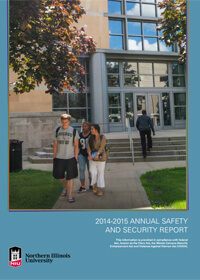 Northern Illinois University released its 2014-15 Annual Campus Safety and Security Report, in accordance with the Jeanne Clery Disclosure of Campus Security Policy and Campus Crime Statistics Act, which requires that each post-secondary institution file a report annually by October 1.
Northern Illinois University released its 2014-15 Annual Campus Safety and Security Report, in accordance with the Jeanne Clery Disclosure of Campus Security Policy and Campus Crime Statistics Act, which requires that each post-secondary institution file a report annually by October 1.
NIU provides information regarding campus security, personal and fire safety, including topics such as crime prevention, emergency response procedures and crime reporting policies, in addition to crime and fire statistics for the most recent three calendar years.
The Annual Security Report containing security and safety information is available at clery.niu.edu, or by contacting the University Police Department and Public Safety Department at 815-753-9628 to receive a hard copy. The Annual Fire Safety Report is also available at clery.niu.edu or by contacting the Environmental Health & Safety Department at 815-753-0404 to receive a hard copy.
For the first time, statistics for stalking, domestic violence and dating violence are included in the annual security report, in accordance with the obligations set forth in the Violence Against Women Reauthorization Act’s (VAWA) campus sexual violence provisions. Under VAWA, colleges and universities are required to:
- Report domestic violence, dating violence, and stalking, beyond crime categories the Clery Act already mandates;
- Adopt certain student discipline procedures, such as for notifying purported victims of their rights; and
- Adopt certain institutional policies to address and prevent campus sexual violence, such as to train in particular respects pertinent institutional personnel.
In July, President Doug Baker announced the formation of a presidential task force to build upon the university’s previous work in sexual assault prevention and Clery Act reporting. The NIU presidential task force is to provide its recommendations to President Baker in October.
The Clery Act requires each and every college and university that participates in federal financial aid programs to keep and disclose information about crime on and near campus. Compliance is monitored by the United States Department of Education.
The law is named for Jeanne Clery, a 19-year-old Lehigh University freshman who was raped and murdered in her campus residence hall in 1986. The Clery Act, signed in 1990, was originally known as the Crime Awareness and Campus Security Act.
The Clery Act contains several requirements for colleges and universities. In addition to the publication and distribution of the annual campus security report—which is required to provide crime statistics for the previous three years, policy statements regarding various safety and security measures, campus crime prevention program descriptions, and procedures to be followed in the investigation and prosecution of alleged sex offenses—the act requires maintenance of a public crime log of all reported crimes within the past 60 days, it requires institutions to provide timely warnings of crimes representing a threat to the safety of members of the university community, and it must keep the most recent three years of statistics for crimes that occur on campus, in residence halls, in non-campus buildings or on public property within or immediately adjacent to and accessible from the campus.
